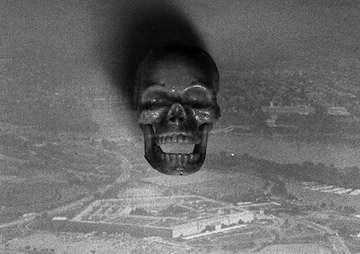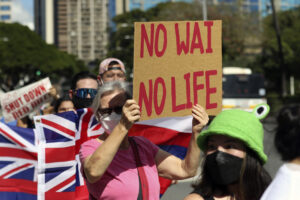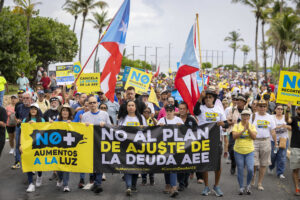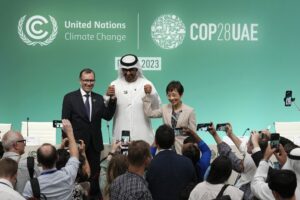For the World’s Sake: Revolution in the United States
As a result of the United States' disproportionate political, economic and military power, 121 million American voters hold the fate of billions in their hands every four years. Photo by Don Fulano (CC BY-SA 2.0)
Photo by Don Fulano (CC BY-SA 2.0)
By Garry LeechThis piece first appeared at CounterPunch.Garry Leech is an independent journalist and author of numerous books including Capitalism: A Structural Genocide (Zed Books, 2012); Beyond Bogota: Diary of a Drug War Journalist in Colombia (Beacon Press, 2009); and Crude Interventions: The United States, Oil and the New World Disorder (Zed Books, 2006). He is also an editor of the Cape Breton Independent and a lecturer in the Department of Political Science at Cape Breton University in Canada.
How can it be just that so few dictate the lives of so many? I’m not referring to the 1 percent and the 99 percent. I’m speaking of the voting population in the United States and in its minions Canada and Britain. Meanwhile, the billions of people around the world whose lives are directly impacted by the decisions made by elected officials in these wealthy nations have virtually no voice. The US Empire is far from democratic. It is authoritarian! It is imperialist! It is unjust! And a revolution is needed.
In the 2012 presidential election, 121 million Americans voted, which constituted 57 percent of the voting age population. This voter turnout, while not a significant majority, nevertheless provides legitimacy for the US political system, particularly in the eyes of many Americans.
But the political decisions made by elected US officials reach far beyond that nation’s borders. Through its foreign policy and its dominant role in international institutions such as the United Nations Security Council, NATO, the International Monetary Fund (IMF) and the World Bank, the United States impacts the lives of virtually everyone on the planet. In other words, the electoral choices of 121 million Americans directly impact the lives of billions of people around the world. How is this democratic?
National borders are repeatedly decimated in the name of ‘free market’ capitalism so that corporations can freely move their capital and profits around the globe to take advantage of cheap labour and natural resources, particularly in the global South. But while the economy is becoming increasingly globalized, democracy remains rooted in the nation-state.
But all nations are not equal. The United States has inherited the role that European colonizers played for hundreds of years. And like the ruling powers in the old colonial system, the United States wields a disproportionate amount of political, economic and military power in contemporary imperialism. As a result of this dominance, 121 million American voters hold the fate of billions in their hands every four years.
But the fate of the world’s population is the farthest thing from the minds of most US voters at election time. They are primarily focused on their own immediate needs such as jobs, taxes, security and other issues that they perceive to be of importance to their daily lives. They are not concerned with—or fail to see—how the political, economic and military policies implemented globally by the government they elect negatively impact many people around the world. Consequently, there is little chance of Americans voting against what they perceive to be their own interests for the benefit of a majority of the world’s population.
But what happens when those people negatively impacted by US policies attempt to take matters into their own hands and challenge the undemocratic US imperialist model? Washington inevitably responds in violent ways to defend the status quo. This is why so many people around the world do not believe that the United States is a force for good. In fact, in a 2013 WIN/Gallup poll conducted in 68 countries, the United States was overwhelmingly viewed as the greatest threat to world peace—as it is each year the survey is conducted.
The American Empire
Washington’s global political dominance manifests itself through military and economic support to allied governments regardless of how corrupt, undemocratic and violent they may be in order to defend US interests. These interests primarily consist of enabling the profit-taking activities of multinational corporations and ensuring a continuation of the consumer lifestyles enjoyed by many Americans.
The consequences of prioritizing corporate profits and consumer lifestyles in wealthy nations have been devastating for many around the world. According to the World Health Organization, more than 10 million people die annually in Latin America, Africa and Asia due to a lack of access to adequate healthcare and medicines. This is the inevitable result of the capitalist system, which prioritizes profits over everything else.
For example, it is more profitable for pharmaceutical companies to produce ‘lifestyle’ drugs to address such issues as baldness and other non-life threatening conditions for people in wealthy nations who can afford to purchase them than to manufacture essential medicines for the poor who do not constitute a viable market. The inevitable consequence is structural genocide; a tragedy that has be made visible by the Ebola epidemic in West Africa.
When governments do come to power and challenge US interests then Washington inevitably responds with economic sanctions, support for a military coup or, if necessary, direct military intervention. The objective is to ensure that the capitalist model is the dominant social model throughout the world. And in order to ensure that this model is accepted as legitimate it is crucial that populations around the world internalize Western liberal values.
The ongoing military interventions in the Middle East and Central Asia are a continuation of the empire-building that began after Christopher Columbus ‘discovered’ the Americas in 1492. The values and cultural practices of the indigenous peoples of the Americas were not aligned with the liberal and Christian religious values prominent in Europe, particularly Enlightenment thought, which provided the philosophical foundation for capitalism. Consequently, those indigenous that resisted—and many who didn’t resist—the imposition of European values onto their cultures were slaughtered.
Most of those that survived were effectively interned in reservations and generation after generation subjected to forced assimilation through a Eurocentric education system. Similarly in Africa and Asia, European colonialism imposed liberal ideas and Christianity on peoples in order to inculcate them with the Western values essential to validate the capitalist system that drove the colonial project.
More recent attempts to challenge this imperialist process have similarly been met with violence. The United States has overthrown virtually all governments that have challenged its hegemony. Just a partial list of countries whose governments were overthrown by US-backed coups or military interventions in recent decades includes Iran (1953), Guatemala (1954), South Vietnam (1963), Brazil (1964), Indonesia (1965), Chile (1973), Argentina (1976), Haiti (1991 and 2004), Afghanistan (2001), Iraq (2003), Honduras (2009) and Libya (2011). Some of these governments were democratically-elected in free and fair elections.Other governments that have dared to challenge US hegemony have managed against great odds to survive all efforts to bring them down. Cuba repelled the Bay of Pigs invasion in 1961 and has endured an inhumane US-imposed economic blockade for more than half a century. The UN General Assembly recently voted overwhelming for the 23rd time to condemn the blockade with 188 countries calling for its end and only two—the United States and Israel—voting against the resolution. Similarly, Venezuela survived a US-supported coup attempt against President Hugo Chávez in 2002 and continues to be routinely demonized by US policymakers.
Radicalizing Islam
US militarism in the Islamic world has similarly sought to challenge those who resist the implementation of the Western liberal values essential for capitalist globalization. Fifty years ago there were no prominent extremist Islamic groups. The contemporary evolution of extremism can be dated to the US-backed overthrow of Iran’s popular moderate and largely secular Prime Minister Mohamad Mossadegh in 1953 after he nationalized the oil industry. The Shah was re-instated as ruler of Iran and he immediately re-opened the country to Western oil companies while his US-trained secret police brutally repressed all dissent.
It was under the despotic rule of the US-backed Shah that Western cultural practices became commonplace in Iran due to the presence of so many US and British oil workers. Meanwhile, increasing numbers of Iranians were enduring poverty while the Shah and Western oil workers flaunted the country’s resource wealth in their faces. The growing resentment caused by these circumstances provided an ideal environment for Islamic fundamentalists to make inroads among the Iranian population. And in 1979, the majority of Iranians supported the fundamentalist revolution that overthrew the corrupt and brutal regime of the Shah.
In the ensuing decades, Washington’s support for corrupt regimes in the region that serve Western interests, particularly with regard to ensuring a steady flow of oil, has further radicalized elements of the Islamic world. The United States also provided more than $4 billion in military and economic aid to Mujahideen rebels fighting against the Soviet Union in Afghanistan during the 1980s. One of the Mujahideen rebels supported by Washington was Osama bin Laden who, following the removal of the Soviet Western invaders from the Islamic world, founded Al-Qaeda and shifted his sights onto the new Western invader when the US military established bases in Saudi Arabia in 1991. The numerous US military interventions in the region since 1991and Washington’s unconditional support for Israel have only added fuel to the fire of extremism.
It is clear that US military intervention in the Middle East is not motivated by the promotion of democracy and human rights. After all, if US foreign policy were motivated at all by these noble causes then Washington would have long ago overthrown the ruthless dictatorship that governs its close ally Saudi Arabia and rid the region of its other authoritarian friends. And given that the Saudi government routinely publicly beheads its own citizens—19 of them in July and August—Obama’s decision to commit the US military to fight alongside the Saudi beheaders against the Islamic State beheaders speaks volumes about human rights. Evidently, it is not beheading per se that makes one ‘evil,’ but rather the beheading of Westerners in order to challenge US interests.
The failure of moderate and more secular nationalist groups to address the needs of Muslims has resulted in the emergence of more radical fundamentalist organizations such as Hezbollah, Hamas, the Taliban, al-Qaeda and now the Islamic State. In short, we are witnessing a radicalization on a regional scale similar to that which occurred nationally in Iran following US intervention in that country and support for the Shah’s brutal regime.
Washington’s imperialist policies have prioritized the interests of Western oil companies and Western economies over those of Islamic peoples. Not surprisingly, this has resulted in a radicalization of the growing opposition to US military, political and economic interventions in the Islamic world. The US response to this emerging radicalism hasn’t been a re-evaluation of its imperialist approach, but rather to intensify it. How else can the US-led military invasions and occupations of Afghanistan and Iraq be explained? In both countries, the objective was to militarily impose Western liberal democracies on Islamic peoples and to incorporate the resources and economies of those nations into the global capitalist system.
Despite the oft-repeated rhetoric of Western leaders that military intervention in the region does not constitute a war against Islam, it is a war against Islam. It is a war against those Islamic values that are contrary to the gross and inhumane profit-taking of multinational corporations and investment banks. It is a war against those collective values and beliefs that conflict with the individualistic and self-indulgent consumer culture at the core of Western capitalism. It is a war against those Muslims who have become disenchanted with a democratic model and economic system that has left them disempowered and impoverished.
Not only has neoliberal globalization left many in the Islamic world in poverty, but it has also failed to give them any meaningful political voice through the ballot box. When Muslims elect an Islamic party to power in Western-style elections, the new government is immediately targeted by the United States and its allies. Egyptians took to the streets in 2011 as part of the Arab Spring uprisings to demand the removal of the country’s US-backed dictator Hosni Mubarak and the holding of elections. The following year a majority of Egyptians elected the presidential candidate who represented the country’s leading Islamic organization, the Muslim Brotherhood. One year later, Washington and its allies gladly turned a blind eye when the US-backed Egyptian military overthrew the new democratically-elected government.
This was not the first time that Western powers undermined democracy in the Islamic world. In 1991, when parliamentary election results in Algeria made it apparent that the Islamic Salvation Front would win a two-thirds majority, the military stepped in and annulled the election rather than allow an Islamic party to gain power. The United States and France supported the coup because they were opposed to the establishment of an Islamic government in Algeria, even though it would have been a democratically-elected government that represented the wishes of a majority of Algerians. The price of this abrogation of the democratic process was a civil war that resulted in the deaths of more than 150,000 people over the next decade.
Similarly in 2006, the Palestinian people voted in favor of the Islamic party of Hamas over the more moderate Fatah Party, thereby allowing Hamas to head the Palestinian Authority government. The United States, Canada and the European Union responded to the election results by immediately cutting off funding to the new Hamas-led government and allowing Israel to implement an inhumane blockade of the Hamas stronghold of Gaza.These cases send a clear message to Muslims: Accept Western-style democracy but do not elect an Islamic party. Is it any wonder that growing numbers of Muslims are becoming disenchanted with Western-style democracy and a global economic system that primarily serves Western interests?
This growing disenchantment has manifested itself in a new ‘threat’ that has emerged from the US invasion and occupation of Iraq. The Islamic State is even more extremist than al-Qaeda in its efforts to resist Western imperialism. Despite this reality, the Western response to the Islamic State is to replicate the previous military interventions in the Middle East that brought al-Qaeda and the Islamic State into existence in the first place.
Washington is intensifying a military intervention in the Islamic world that has already killed thousands of innocent civilians. In fact, the number of innocent Muslims killed by US bombs far surpasses the number of Westerners killed by extremist Islamic groups. History suggests that even if the United States and its allies militarily defeat the Islamic State, the inevitable killing of civilians by Western forces will result in its replacement by an even more extreme group.
The real reason the United States and its Western allies are targeting the Islamic State becomes apparent when that extremist group is compared to the Mexican drug cartels. Mexico’s cartels pose a much greater violent threat to civilians, including Americans, than does the Islamic State. They killed more than 16,000 people in 2013, almost double the number that died in Iraq. More crucially from the US perspective, over 300 US citizens have been killed by Mexico’s drug cartels in the past six years, which far surpasses the number of Americans killed by the Islamic State.
Furthermore, the cartels not only behead many of their victims, they dismember their entire bodies. They also routinely enlist youth as young as eleven and regularly target women and children. The cartels control vast tracts of territory in Northern Mexico and the government cannot defeat them. And yet, we are not bombing Northern Mexico to eliminate this violent group. Why not? Because it is not human rights or democracy promotion that motivates the US government to act; Washington responds to perceived threats to the capitalist system.
In Mexico, the violent actions of the drug cartels do not infringe on the capacity of multinational corporations to generate profits through the exploitation of that country’s cheap labour and natural resources. The drug cartels do not interfere with the free trade economic model, which is most visibly represented in Mexico by the North American Free Trade Agreement (NAFTA). As a matter of fact, drug traffickers rely on the constant and uninterrupted flow of trade across the US-Mexico border to transport their product. In short, unlike the Islamic State, Mexico’s drug cartels do not constitute a challenge to Western liberal values and the capitalist economic model promoted by the United States.
Conclusion
Western imperialism has spent the better part of five hundred years trying to impose Western values on peoples throughout the world. These peoples have never had a meaningful voice in the political, social and economic policies that have been imposed on them. Imperialism, by definition, is undemocratic. While the policies of the US government impact billions of people around the world, only a tiny percentage of the global population have any say in electing that government. And the overwhelming majority of the 121 million Americans who vote give little thought to how their ballot will impact Muslims in the Middle East, indigenous peoples in Latin America, and billions of others throughout Africa and Asia. Their voting decisions are primarily determined by their perceived immediate needs, which provides a veneer of legitimacy not only to US democracy but also to US imperialism.
Consequently, it is highly unlikely that in the foreseeable future a revolution will occur in the imperial heartland. It is much more likely to occur in the outlying regions of the US Empire. In fact, it is already occurring in various forms, from the indigenous movements for autonomy in Latin America to the extremist Islamic fundamentalism of groups such as al-Qaeda and the Islamic State in the Middle East. At the current time, the overwhelming majority of the world’s population that stands opposed to US imperialism are moderates who are non-violently seeking autonomy and a meaningful voice in the major decisions that impact their lives. But if we continue to crush all moderate opposition to US imperialism, we will likely further spread the sort of extremism that has emerged in the Middle East.
For the world’s sake, it is crucial that a revolution occur that brings down the US imperialist system before the violent extremism it fuels leads to global chaos. And if the US Empire is not brought down by those living at its core then it must be overthrown by its ‘subjects’ in the outlying regions who endure taxation—through the exploitation of their cheap labour and natural resources—without representation. After all, they have nothing to lose but their chains.
Your support matters…Independent journalism is under threat and overshadowed by heavily funded mainstream media.
You can help level the playing field. Become a member.
Your tax-deductible contribution keeps us digging beneath the headlines to give you thought-provoking, investigative reporting and analysis that unearths what's really happening- without compromise.
Give today to support our courageous, independent journalists.






You need to be a supporter to comment.
There are currently no responses to this article.
Be the first to respond.